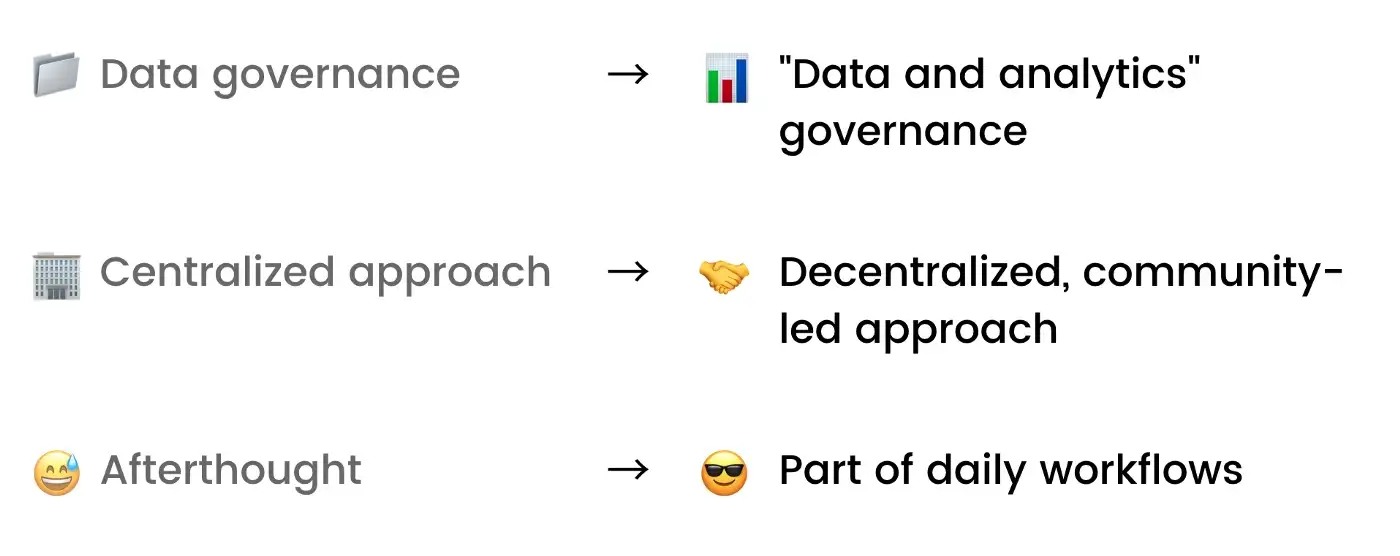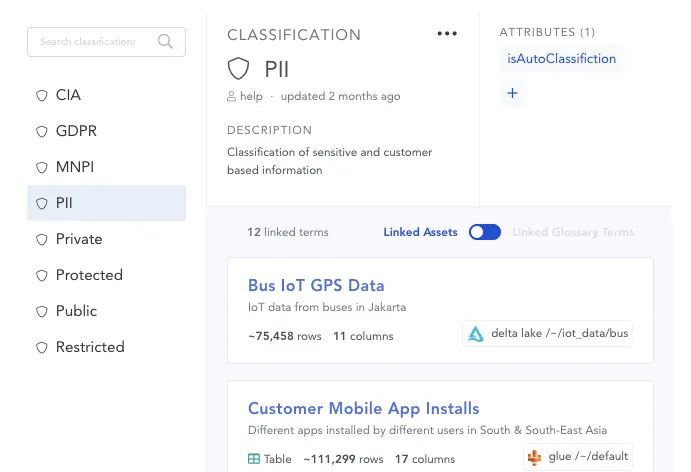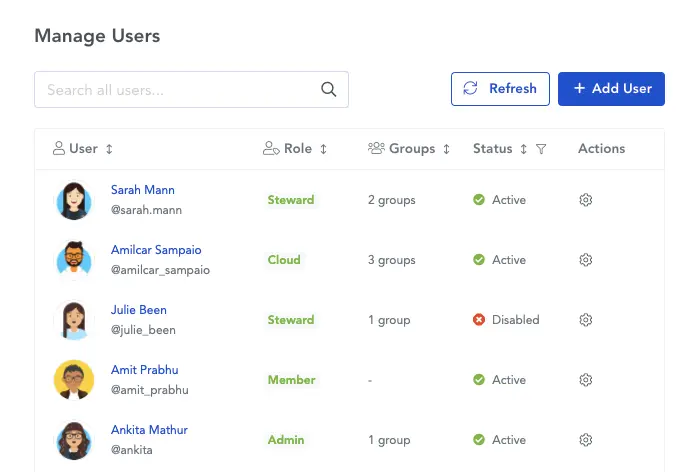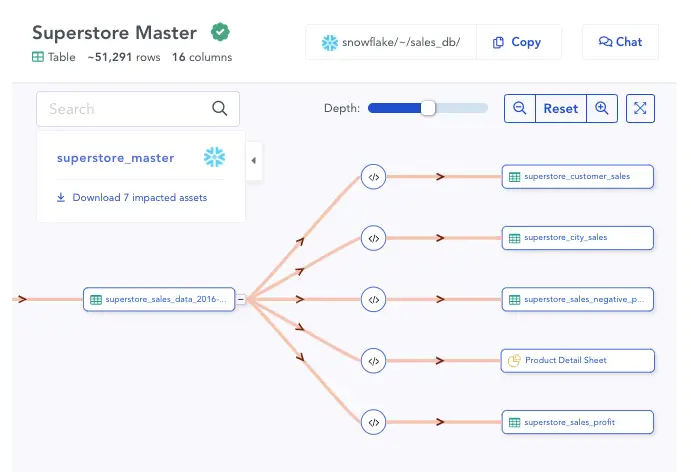Data Governance Benefits: 4 Reasons Why It Matters in 2025
Share this article
Data governance benefits organizations by ensuring data accuracy, consistency, and compliance. It mitigates risks by protecting sensitive information and enforcing regulatory standards.
See How Atlan Simplifies Data Governance – Start Product Tour
Effective governance improves data quality, enabling better decision-making through reliable insights. It streamlines access control, enhances accountability, and fosters transparency.
By driving operational efficiency and supporting scalable growth, data governance becomes a critical component for modern enterprises to manage and utilize their data assets effectively.
Around 2016, the modern data stack went mainstream. This refers to a collection of technologies, tools, and capabilities that help businesses today store, manage, and use their data.
These tools are unified by three key ideas:
- Self-service data analytics
- “Agile” data management
- Cloud-first and cloud-native
Even though the modern data stack has made it easier to ingest and transform data, governance has become one of the biggest barriers in the path of true data democratization.
Here, let us explore the importance and benefits of a data governance program in your organization.
Table of contents
Permalink to “Table of contents”- What is data governance?
- Why does data governance matter?
- How does data governance benefit organizations?
- The 4 biggest benefits of data governance
- 1. Enables true data democratization
- 2. Builds effective collaboration between teams
- 3. Protects the integrity and relevance of data
- 4. Helps comply with data protection laws and regulations
- How organizations making the most out of their data using Atlan
- Bottom line on data governance benefits
- FAQs about Data Governance Benefits
- Data governance benefits: Related reads
What is data governance?
Permalink to “What is data governance?”Before diving deeper into the benefits of data governance, let’s have a quick refresher on the concept:
According to Gartner:
“Data governance is the specification of decision rights and an accountability framework to ensure the appropriate behavior in the valuation, creation, consumption, and control of data and analytics.”
Here’s a simpler way to understand: Data governance is simply about deciding how to decide. It’s a set of policies, processes, and standards to collect, manage, and store data for better decision-making.
Read more about what is data governance and why is it important.
Why does data governance matter?
Permalink to “Why does data governance matter?”Why is data governance necessary?
Because it ensures that we act in the best interest of everyone.
Be it regions, countries, businesses, or data - in its essence governance ensures that equitable solutions are met for everyone, and everyone’s rights are upheld.
This is what most of us forget because conventionally data governance comes with the baggage of being seen as strict rules that are dealt top-down with a heavy hand. Something that inherently pronounces control and not a privilege.
Data governance needs to go through a renaissance, it needs a paradigm shift at multiple levels.

Data governance needs a paradigm shift at multiple levels. Image by Atlan
Here’s a great blog that talks about how changing the narrative around data governance will help answer the why(s) of data governance much better, and will get seamless buy-in from everyone in the organization.
Fundamentally, data governance ensures effective collaboration and data democratization.
How does data governance benefit organizations?
Permalink to “How does data governance benefit organizations?”Data governance benefits organizations by ensuring the proper and prompt usage of data throughout the organization.
Here are some examples of how:
- Setting standards for data quality — accuracy, consistency, timeliness, and completeness of data assets.
- Setting data access control policies and a program for recurrent monitoring of quality, security, and privacy checks.
- Helping reduce the risk of major disruptions exposing data.
- Defining data retention and data deletion policies.
- Enables data assets to be auditable across the entire lifecycle and therefore be in compliance with data protection laws and regulations.
- Improves consistency and confidence in risk assessment and business decision-making and thereby maximizing the ROI of your data assets.
Organizations are working with copious amounts of data now. To understand that data, data governance is no longer good to have, it’s a must-have.
But are they really maximizing the true potential of data governance? The real benefits of data governance can truly be unlocked once you understand the genesis of data governance, and what it’s really meant to do.
The 4 biggest benefits of data governance
Permalink to “The 4 biggest benefits of data governance”Here are the 4 main benefits of data governance.
- Enables true data democratization
- Builds effective collaboration between teams
- Protects the integrity and relevance of data
- Helps comply with data protection laws and regulations
Plus effective implementation of data governance will have countless positive impacts on data quality, data analytics, data reports, and data-related decision-making as well.
Let’s understand each data governance benefits in detail, and how they help data teams work better together:
1. Enables true data democratization
Permalink to “1. Enables true data democratization”Everyone has a right to data that will help them make better decisions. Data governance ensures that you can uphold that right, without compromising on data security.
With the right modern data governance platforms, you can create granular and customized tag-based access policies.
Examples of tags include business-related metadata, technical metadata, or even security classifications. Such a system also ensures transparency about how decisions are taken regarding which team member has access to certain data and who doesn’t.

Example of implementing tag-based access policies. Image by Atlan
2. Builds effective collaboration between teams
Permalink to “2. Builds effective collaboration between teams”Having a clear understanding of who should have access to data and who shouldn’t, also reduces the friction between diverse data practitioners existing in the same or different teams.
For e.g. A person looking at a restricted data asset knows who owns it, and can quickly request access with the click of a button. Also, if a particular data is publicly discoverable, no matter if it’s in a different domain, a data user doesn’t need to wait for days for IT to give them access to that data or for domain experts to relay what that data actually means.

Managing users is easy for Data Stewards, via, group, actions, or even personas. Image by Atlan
3. Protects the integrity and relevance of data
Permalink to “3. Protects the integrity and relevance of data”For data to be the bedrock of impactful decisions it must be relevant, accurate, trustworthy, easy to use, and have high quality.
Data governance ensures that by employing the following:
- Tracking and managing all data in an organization with help of data catalogs.
- Creating business glossaries for ease of understanding of this data.
- Setting up data lineage to enable root-cause analysis and impact analysis.
- Management of data access via established and communicated policies.

Automate lineage via SQL parsing. Image by Atlan
4. Helps comply with data protection laws and regulations
Permalink to “4. Helps comply with data protection laws and regulations”Last but not the least, the reason why most organizations start thinking about data governance - is to comply with data protection laws and regulations.
Even a minor infringement of GDPR or CCPA regulations can cost an organization a fortune. Good data governance tools and processes ensure automated compliance with such regulations and laws. They create universal guidance for the structured creation, storage, and deletion of data.
Also, read → Data Governance for Insights-Driven Business | Data Governance Demonstrating Value | Agenda for data executives includes governance
How organizations making the most out of their data using Atlan
Permalink to “How organizations making the most out of their data using Atlan”The recently published Forrester Wave report compared all the major enterprise data catalogs and positioned Atlan as the market leader ahead of all others. The comparison was based on 24 different aspects of cataloging, broadly across the following three criteria:
- Automatic cataloging of the entire technology, data, and AI ecosystem
- Enabling the data ecosystem AI and automation first
- Prioritizing data democratization and self-service
These criteria made Atlan the ideal choice for a major audio content platform, where the data ecosystem was centered around Snowflake. The platform sought a “one-stop shop for governance and discovery,” and Atlan played a crucial role in ensuring their data was “understandable, reliable, high-quality, and discoverable.”
For another organization, Aliaxis, which also uses Snowflake as their core data platform, Atlan served as “a bridge” between various tools and technologies across the data ecosystem. With its organization-wide business glossary, Atlan became the go-to platform for finding, accessing, and using data. It also significantly reduced the time spent by data engineers and analysts on pipeline debugging and troubleshooting.
A key goal of Atlan is to help organizations maximize the use of their data for AI use cases. As generative AI capabilities have advanced in recent years, organizations can now do more with both structured and unstructured data—provided it is discoverable and trustworthy, or in other words, AI-ready.
Tide’s Story of GDPR Compliance: Embedding Privacy into Automated Processes
Permalink to “Tide’s Story of GDPR Compliance: Embedding Privacy into Automated Processes”- Tide, a UK-based digital bank with nearly 500,000 small business customers, sought to improve their compliance with GDPR’s Right to Erasure, commonly known as the “Right to be forgotten”.
- After adopting Atlan as their metadata platform, Tide’s data and legal teams collaborated to define personally identifiable information in order to propagate those definitions and tags across their data estate.
- Tide used Atlan Playbooks (rule-based bulk automations) to automatically identify, tag, and secure personal data, turning a 50-day manual process into mere hours of work.
Book your personalized demo today to find out how Atlan can help your organization in establishing and scaling data governance programs.
Bottom line on data governance benefits
Permalink to “Bottom line on data governance benefits”The benefits of data governance are endless if implemented well. With the rate at which data consumption and usage are exploding around us, organizations will benefit from having data governance at the heart of their data management principles and not as an afterthought or as a part of the checklist.
FAQs about Data Governance Benefits
Permalink to “FAQs about Data Governance Benefits”1. What are the key benefits of data governance?
Permalink to “1. What are the key benefits of data governance?”Data governance offers multiple benefits, including improved data quality, enhanced data security, compliance with regulations, and better decision-making capabilities. It also enables organizations to democratize data, making it accessible to all stakeholders while ensuring its accuracy and integrity.
2. How can data governance improve data security?
Permalink to “2. How can data governance improve data security?”By implementing robust data governance practices, organizations can define clear policies for data access and usage. This reduces risks associated with unauthorized access and data breaches, ensuring sensitive information is protected.
3. Why is data governance critical for compliance?
Permalink to “3. Why is data governance critical for compliance?”Data governance helps organizations adhere to legal and regulatory requirements by ensuring accurate record-keeping, data traceability, and standardized processes. This reduces the risk of penalties and legal issues.
4. How does data governance support decision-making?
Permalink to “4. How does data governance support decision-making?”With accurate and well-governed data, decision-makers can rely on trusted information to make informed choices. This minimizes risks and enhances strategic planning by providing a consistent data foundation.
5. How does data governance impact data quality?
Permalink to “5. How does data governance impact data quality?”Effective data governance establishes standards and policies for data entry, storage, and maintenance. This ensures that data remains accurate, complete, and consistent across the organization.
Data governance benefits: Related reads
Permalink to “Data governance benefits: Related reads”- What is data governance & why does it matter?
- Data Governance Framework: Examples, Standards & Templates
- 7 Best Practices for Data Governance to Follow in 2025
- Data Governance Roles and Responsibilities: A Quick Round-Up
- Data Governance Policy: Examples, Templates & How to Write One
- Key Objectives of Data Governance: How Should You Think About Them?
- 5 Popular Data Governance Certifications & Trainings in 2025
- 8 Best Data Governance Books Every Data Practitioner Should Read in 2025
- Automated Data Governance: How Does It Help You Manage Access, Security & More at Scale?
- Enterprise Data Governance: Strategy & Key Challenges
- 3 Principles of Data Governance: Pillars of a Modern Data Culture
- Data Governance Model: Why You Can’t Afford to Ignore It
- How to Improve Data Governance? Steps, Tips & Template
Share this article


















